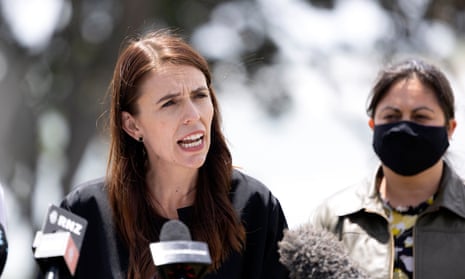In her first press conference of the year, held outside in the central North Island sun, prime minister Jacinda Ardern was almost drowned out by a wave of cicada calls.
The clamour is synonymous with New Zealand summertime, a reminder that the country had managed to snatch a long, hot, largely unrestricted holiday season from the mouth of a late-2021 Delta outbreak.
But as New Zealanders trickle back from vacation to their homes and workplaces, they do so with the knowledge that respite will probably be fleeting.
“Omicron is knocking at our door now,” Ardern told reporters over the buzz. “We won’t stop Omicron, but we can try and slow it down.”
At least three cases of the new variant have been confirmed among border workers and their contacts in Auckland, and there are fears it made have already spread into the wider community.
For now, New Zealand is one of a very small handful of countries keeping Omicron at bay. That path is an increasingly lonely one – very few medium-sized economies have stayed dedicated to Covid-zero or heavy-duty suppression. China, the notable exception, faces increasing questions over how sustainable its elimination strategy is. While Beijing remains fiercely committed to that path, however, New Zealand’s leader is now resigned to battle Omicron, describing its transmission across the country as a matter of “when, not if”.
“Omicron is in every corner of the world at the moment. And we also know that there will be other variants. And we know that we will experience in New Zealand cases at a level that we haven’t experienced before,” Ardern said.
In the meantime, the country will turn to its tried and tested strategy: delay. This has been a central tactic to New Zealand’s Covid game plan.
The country had some advantages from the first days of the pandemic: physical isolation and distance bought it time to observe the damage inflicted on overseas health systems, and to respond by closing its borders and moving to wipe out the disease in-country.
Over and over again, Ardern’s government chose to sustain that initial advantage – opting for conservatism in the face of Covid, watching other countries’ trajectories, buying time to build vaccination rates.
Epidemiologist and public health prof Michael Baker says New Zealand’s “strategic advantage is that we can delay the inevitable.”
“The turn of phrase ‘delaying the inevitable’ [makes it sound] as though: why bother? But I would say delaying the inevitable is an extremely good idea with Covid-19,” he says.
‘Concerning gaps’
In the face of the highly-transmissible variant, however, questions linger about what New Zealand’s future will look like when widespread infections finally arrive - and whether it has used its hard-won time to adequately prepare for the coming wave.
While vaccination rates are high – about 94% of the adult population is now double-vaccinated and children aged 5-12 this month began receiving their jabs this month – the country’s health system is small and vulnerable to overwhelm, especially outside major cities.

A government report on preparedness for Omicron, leaked to Māori Television this week, highlighted concerns that intensive care beds were severely limited, with just one-third, or 108 ICU beds currently free. In several of the country’s 20 district health boards, there was no ICU care available.
Even if initial evidence holds and Omicron is a ‘milder’ variant, the speed at which it spreads could still quickly overwhelm New Zealand’s health system, Baker said.
“As everyone points out, even a small proportion of a big number is still a big number,” he says.
While Ardern has said that an outbreak Omicron would not trigger a lockdown, Baker says they may be necessary to tamp down widespread transmission.
“That’s really the essence of mitigation and flattening the peak – is to say well, for all countries, their ability to look after very sick people is always going to be limited.”
Epidemiologist Dr Jennifer Summers said via Science Media Centre that there were “concerning gaps in New Zealand’s preparation for delaying and managing an Omicron outbreak” and Ardern ruling out lockdowns was “worrying”.
“The health system will be under further immense pressure once Omicron enters the community ... ruling out potential public health measures that could be used to minimise the impact of Omicron is short-sighted,” she said.
From the opposition, the government has faced criticism that it has squandered its window of opportunity by failing to roll out widespread access to rapid testing, make large-enough increases to hospital capacity, or outline clear plans for mask use or ventilation in schools or workplaces.
In the face of Omicron, opposition leader Christopher Luxon said, the government was “embarking on a second year of Covid complacency: a lack of urgency, a lack of a plan, and making things up as they go”.
Even as the country fights to buy itself a few more weeks, its remaining Omicron-free days may be limited. Soon, delay won’t be available as a tactic, Baker said, “given how rapidly Omicron will arrive and spread. That’s if it’s not spreading already - which it could be.”
